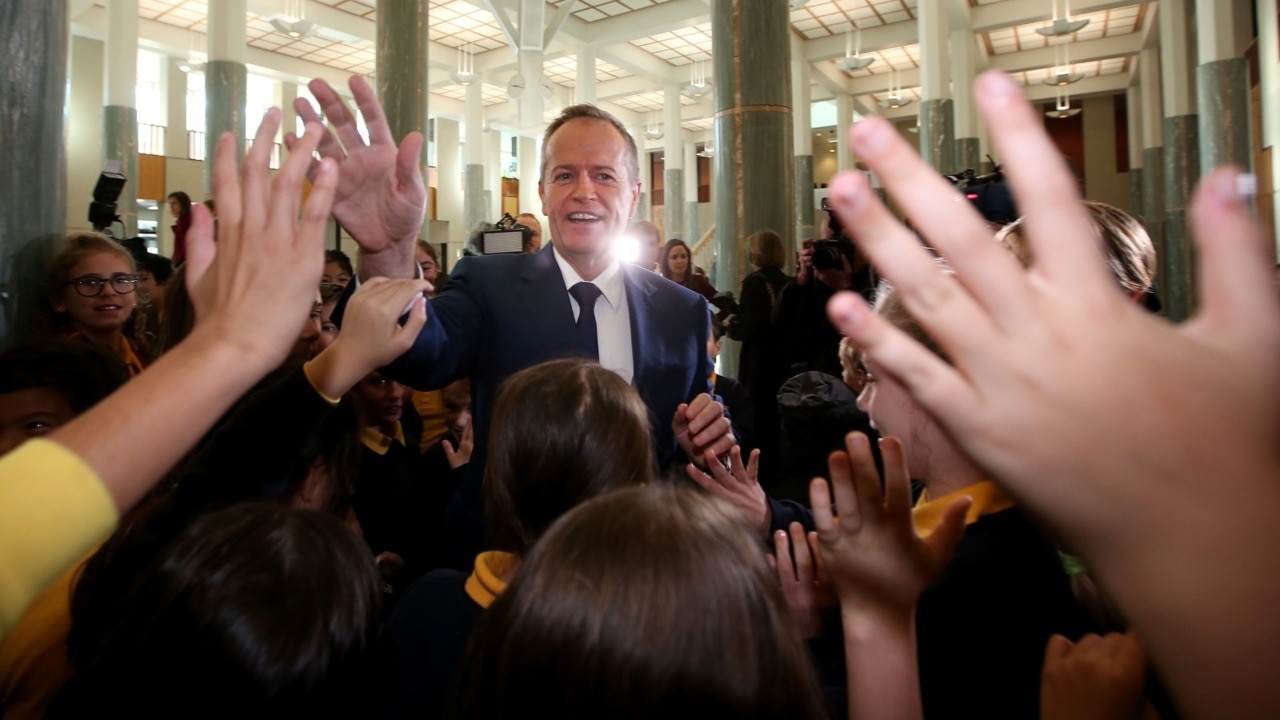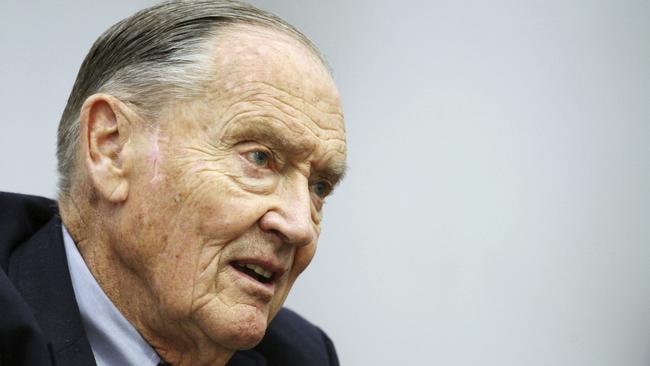Barefoot Investor: Getting to grips with school costs
There’s nothing scarier for parents than the thought of not being able to afford a good education, so those with kids in preschool or primary school should start getting serious about their savings, writes the Barefoot Investor.

Barefoot Investor
Don't miss out on the headlines from Barefoot Investor. Followed categories will be added to My News.
‘Mummy, can I bring my teddy bear with me to my first day of school?” asked my eldest son.
“Oh, I would not recommend that, cobber,” I interjected.
“Of course you can, darling!” said Liz, wrapping him in a loving cuddle while simultaneously giving me a factor-five stink-eye.
Yes, it’s the start of the school year, which means it’s also time for the media to run stories that scare the hell out of parents about the rising cost of education:
“Mind-blowing: Top private school education nears $500,000.”
MELBOURNE EDUCATION COSTS AMONG OUR HIGHEST
PARENTS TAKING LOANS TO PAY FOR PRIVATE SCHOOL
“WARNING: University degrees will soar to $100,000.”
Trust me, the media LOVE trotting out this story each year. There’s nothing more scary for parents and grandparents than the thought of not being able to afford a good education. (And scared eyeballs also look at ads.)
And if you look closely, there’s always one constant element to these “education is expensive” stories: Australian Scholarships Group (otherwise known as ASG).
ASG is the largest provider of educational savings plans in Australia. So the more shockingly they can portray the future costs of education, the more parents and grandparents they can sign up to their savings plans.
For years, independent education experts and consumer advocates like Carolyn Bond, of Community Law Australia, have slammed ASG’s research as misleading.
“They don’t take into account HECS-HELP loans and mostly give you the absolute worst-case cost scenario,” Bond says.
In the past ASIC has whacked ASG when some of its representatives have “made false and misleading statements and engaged in misleading or deceptive conduct”.
Yet it gets worse.
You see, I just found out this week that a guy I know is to become ASG’s new CEO.
When I read the press release I was like “OMG” (and I said it out loud too).
It was like finding out your mate has a tattoo of Justin Bieber on his rump … or
when he turns to you and says “actually, Pauline Hanson does makes some decent points, you know” … or that he’s the new head of a company that you’ve despised for more than a decade.
So … I called him up.
The conversation went something like this.
CEO: “Now Scott, before you get angry, I need to tell you that the outmoded ‘Barefoot disliked’ ASG products were actually closed in October last year.”
Barefoot: “You mean the horribly expensive ones which strip parents of their entire accumulated investment gains if their kids don’t end up going to university?”
CEO: “Well, that’s not exactly how I’d describe them … but … yes.”
Barefoot: “That’s amazing news for the tens of thousands of well-meaning, hardworking parents and grandparents who until now have been trapped in a horribly expensive, horribly complex and horribly restrictive plan. Well done for shutting it down, mate!”
CEO: “Well … we’ve actually only closed it down to new members…”
Barefoot: “Hmmmmm.”
Look, I’m not saying that education isn’t expensive (even at public schools, like my son is going to).
And I’m not saying that parents shouldn’t set up a regular savings plan for it: if your kids are in preschool or primary school, set up a low-cost share fund or investment bond.
If they’re in high school, set up a regular savings plan in a high-interest online saver account.
What I am saying is that you should avoid ASG until they’ve completely cleaned up their act.
Good luck to all the kids going back to school … and the parents and grandparents who are footing the bills.
Tread Your Own Path!

Q&As
ARE YOU TAKING KICKBACKS, BAREFOOT?
PETER ASKS: I have a simple question: does Scott or his team receive payments from Vanguard to recommend their products?
BAREFOOT REPLIES: I have a simple answer to your simple question: NO!
But your question does give me a nice segue into something I really want to talk about:
Jack Bogle, the founder of both Vanguard and the first index fund (the S & P 500 — you’ve probably heard of it), who died a few weeks ago.
Literally the day before his death I put in a request to interview him, hoping to hear his wisdom on what could be done about the embarrassment that is our fee-gouging retirement industry.
Sadly, it wasn’t to be.
But he’s a legend and you need to hear his story.
Jack Bogle was a rebel who set up Vanguard in 1975 as a non-profit. Vanguard could have made him one of the richest people on earth.
But it didn’t. Instead, he put investors first with an unrelenting focus on lowering fees. Warren Buffett regarded Bogle as his hero, saying:
“If a statue is ever erected to honour the person who has done the most for American investors, the hands-down choice should be Jack Bogle.”
Last year the Vanguard index fund beat about 85 per cent of the 100 large cap Aussie fund managers.
So, faced with this overwhelming evidence, why don’t our Aussie super funds embrace low-cost index investing? In fact, that’s the exact question I was going to ask Jack.
Now I don’t want put words in his mouth, but my guess is that he would point
to the collective $30 billion a year in fees trousered by our super funds.
Or to quote the man himself: “The miracle of compounding returns is overwhelmed by the
tyranny of compounding fees.”
RIP Jack!

HONOURING MY HUSBAND’S LEGACY
LISA ASKS: My husband passed away on New Year’s Day at the age of 37.
I am 26 years old and for the past four years he and I have had full-time care of his daughter. The day before he passed, we listened to your audiobook.
He was so excited to make the changes and had his “alpaca attitude” on.
Unfortunately, he did not have a will and had eight super accounts.
I am heartbroken but somehow need to sort this out.
Any advice on where to go from here?
BAREFOOT REPLIES: I am so sorry for your loss. The most important thing to do right now is look after yourself and your stepdaughter.
The admin that’s required after someone dies can be overwhelming … especially when you’re grieving.
So the best thing you can do is find someone (like a good friend or a trusted adviser) who can help you with it. Your husband has died without a will (this is called dying “intestate”). You’ll need to apply for letters of administration. An administrator will then be appointed and your husband’s estate will be distributed based on a predetermined formula.
As for super, you’ll need to contact each of his super funds and ask what’s required to receive the “death benefit” payment, which will be a combination of his final balance and any insurance held at the time of his death.
Finally, when you start to get on top of things follow the Barefoot Steps with all the “alpaca attitude” you can muster.
You got this.
If you have a burning money question, go to barefootinvestor.com and #askbarefoot
The Barefoot Investor for Families: The Only Kids’ Money Guide You’ll Ever Need (HarperCollins) RRP $29.99
The Barefoot Investor holds an Australian Financial Services Licence (302081). This is general advice only. It should not replace individual, independent, personal financial advice
Originally published as Barefoot Investor: Getting to grips with school costs


